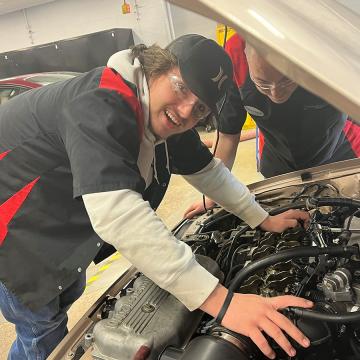Applying Math and Science Perspectives in Car Maintenance
Dalton Peters says he's never been much of a "book person," but is using math and science principles every day while honing his craft.

Dalton Peters
“As long as you’re willing to work, you will learn a lot and have great opportunities.”
Dalton Peters picked up basic car repair from his step dad, and he's always been interested in working in the industry. He got a start working on diesel equipment during harvest last Summer, traveling from Texas to Montana, and when he got the opportunity to attend Francis Tuttle's Automotive Service Technology, this Crescent senior jumped on it.
Admitting he’s not much of a book person, he started with a new perspective because he wanted to improve his skills and earn certifications. He found that he has learned to apply principles of math and science in automotive work, and has also upgraded his time management and organization skills, as well as expanded his social life at Francis Tuttle.
Math and science sneak into your life and sometimes you may not even realize it. Examples are all around us, such as using math to determine engine size or spark plug gap, and physics is applied to measure horsepower or engine efficiency. How those disciplines come into play is subtle, but Dalton's recognition is valid.
His favorite thing about his class is the ability to work on vehicles, every day, and he likes just being on campus, working through problems to accomplish goals. He adds that he tells others to absolutely come to Francis Tuttle. “As long as you’re willing to work, you will learn a lot and have great opportunities.”
Great perspective, Dalton, for all of us!